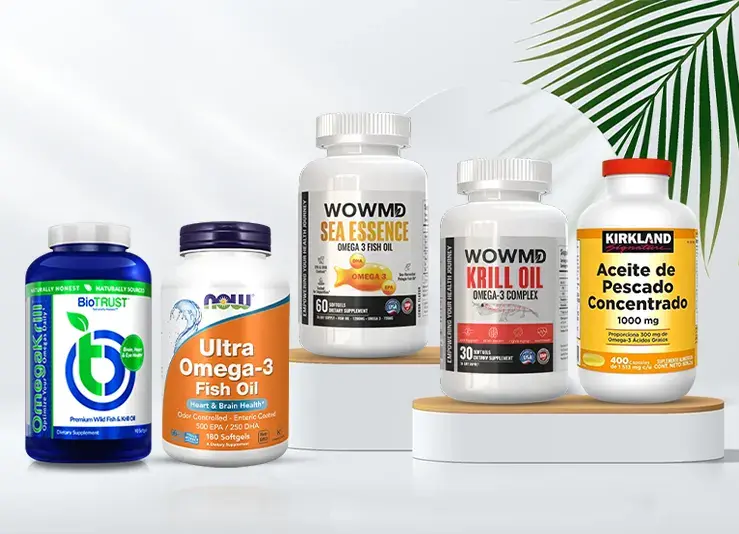Overview
Very few people evr notice or realize the importance of maintaining healthy levels of essential fatty acids in their bodies. However, despite being often overlooked, essential fatty acids are very important in overall health and well-being. A large portion of the population takes in insufficient omega-3s compared to what is required and this leaves a nutritional deficit that has impacts on aspects such as heart health as well as mental capabilities.
Omega-3/fish oil supplements have become the hypes that fill this gap. But with so many products in the market and conflicting information on each of them, it seems hard to get the right supplement. This guide will explain the importance of these fundamental nutrients as well as how they behave to enable you to make good choices regarding your health.
Key Takeaways
- Showcases fish oil’s role in women’s beauty and wellness.
- Highlights supplements that enhance skin glow and hormonal balance.
- Reviews clean-label brands free from unnecessary fillers.
- Explains the link between omega-3s and mood or stress relief.
- Recommends options tailored for everyday women’s health needs.
Are Omega-3 and Fish Oil Supplements the Same?
Omega-3 and fish oil supplements might be referred to interchangeably, but the two are not exactly similar. Omega-3 is a group of essential fatty acids, which includes mainly EPA (eicosapentaenoic acid), DHA (docosahexaenoic acid), and ALA (alpha-linolenic acid). Fish oil is merely one way of getting omega-3s, through fatty fish such as salmon, mackerel, and sardines.
Omega-3s are found in fish oil supplements, but not all omega-3 supplements are fish oil supplements. Other supplies consist of krill oil and algae oil as sources of omega-3s in a phospholipid form, which may be better assimilated, as well as vegetarian and vegan sources in algae oil. The sources vary in their characteristics of bioavailability, sustainability, and other nutrients per source.
The major difference is the origin and the medium, and not the final objective. Whether you decide to use fish oil, krill oil, or algae-based omega-3s, the ultimate idea is that you will get more EPA and DHA, the most bioavailable type of omega-3 fatty acids that your body requires to stay healthy.
Our Top Picks
- Best for: Heart, brain, and joint health with ultra-pure fish oil.WOWMD Sea Essence Omega-3Jump to Review
- Best for: Inflammation and antioxidant support with krill oil and astaxanthin.OmegaKrillJump to Review
- Best for: Easy absorption and daily joint + heart support.WOWMD Krill Oil Omega-3Jump to Review
- Best for: Budget-friendly omega-3 support for overall wellness.Kirkland Signature Natural Fish OilJump to Review
- Best for: Cardiovascular support and clean, certified nutrition.NOW Foods Omega-3 180 EPAJump to Review
Best Omega-3 Supplements Product Information
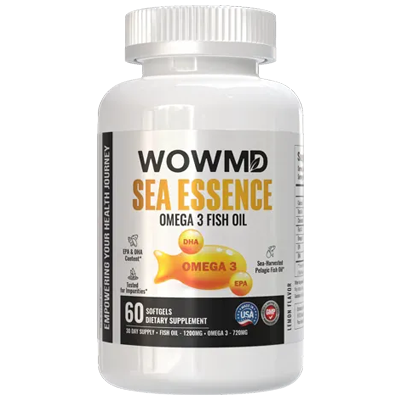
WOWMD Sea Essence Omega-3
![]() (4.9/5.0)$58.50 At Official Website
(4.9/5.0)$58.50 At Official Website
Active ingredients:
EPA (Eicosapentaenoic Acid), DHA (Docosahexaenoic Acid), Concentrated Fish Oil
Specifications:
- High-potency marine-sourced omega-3 formula
- Third-party tested for purity and potency
- Molecularly distilled for contaminant removal
- Sustainable fishing practices certified
Description
Clinically-formulated supplement designed for maximum bioavailability, featuring pharmaceutical-grade processing standards that ensure consistent potency and effectiveness in every dose.
- Brand: WOWMD
- Form: Softgels
- Return Policy: 60-Days
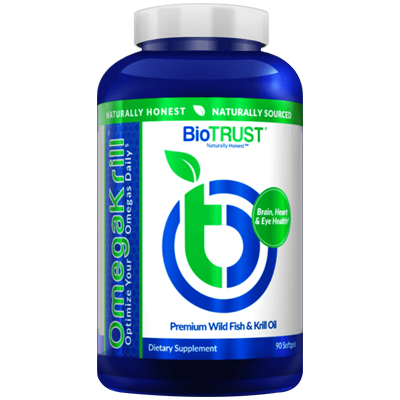
OmegaKrill
![]() (4.5/5.0)$24.00 At Official Website
(4.5/5.0)$24.00 At Official Website
Active ingredients:
Krill Oil, EPA (Eicosapentaenoic Acid), DHA (Docosahexaenoic Acid), Astaxanthin
Specifications:
- Pure Antarctic krill oil with natural astaxanthin
- Phospholipid delivery system for enhanced absorption
- Third-party tested for heavy metals and contaminants
- Sustainable Marine Stewardship Council certified
Description
Combines omega-3 benefits with natural astaxanthin’s powerful antioxidant properties, offering dual protection against inflammation and oxidative stress in one supplement.
- Brand: OmegaKrill
- Form: Softgels
- Return Policy: 60-Days
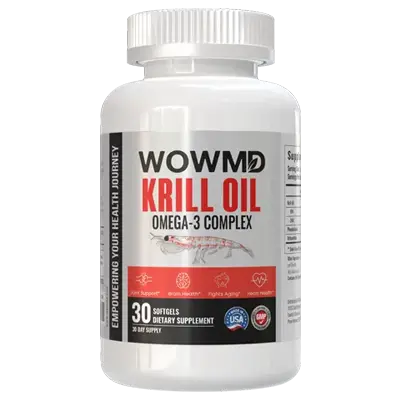
WOWMD Krill Oil Omega-3
![]() (4.9/5.0)$58.50 At Official Website
(4.9/5.0)$58.50 At Official Website
Active ingredients:
Krill Oil, EPA (Eicosapentaenoic Acid), DHA (Docosahexaenoic Acid), Astaxanthin
Specifications
- Antarctic krill sourced with astaxanthin antioxidant
- Superior bioavailability compared to fish oil
- Phospholipid-bound omega-3s for better absorption
- Sustainably harvested with eco-friendly practices
Description
Small, easy-to-swallow capsules with no fishy aftertaste or burps, making daily supplementation comfortable and convenient for long-term use.
- Brand: WOWMD
- Form: Softgels
- Return Policy: 60-Days
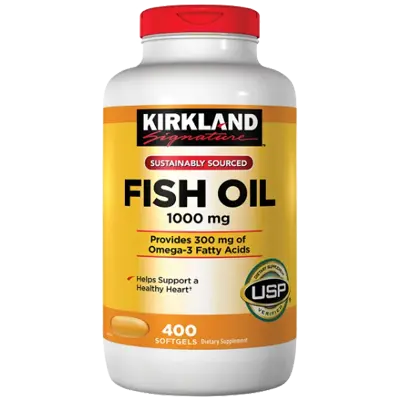
Kirkland Signature Natural Fish Oil
![]() (3.5/5.0)$41.88 At Amazon
(3.5/5.0)$41.88 At Amazon
Active ingredients
Concentrated Fish Oil, EPA (300mg), DHA (200mg), Omega-3 Fatty Acids
Specifications
- 1000mg fish oil per softgel with 500mg total omega-3s
- Molecularly distilled to remove mercury and toxins
- Gluten-free formulation for dietary restrictions
- Cost-effective option without compromising quality
Description
Trusted warehouse club brand offering pharmaceutical-grade quality at wholesale prices, making premium omega-3 supplementation accessible for budget-conscious health enthusiasts.
- Brand: Kirkland Signature
- Form: Softgels (400 count)
- Returns: 90-day return policy
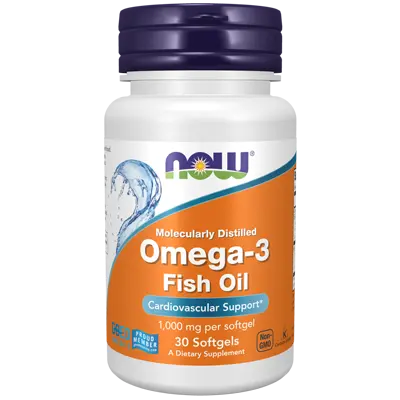
NOW Foods Omega-3 180 EPA
![]() (3.7/5.0)$30.62 At Amazon
(3.7/5.0)$30.62 At Amazon
Active ingredients
Fish Oil Concentrate, EPA (360mg), DHA (240mg), Omega-3 Fatty Acids
Specifications
- Molecularly distilled and ultra-refined for purity
- Multiple certifications: GOED, Non-GMO, GMP, Kosher, Halal
- Keto-friendly and free from gluten, dairy, and soy
- Balanced EPA/DHA ratio optimized for cardiovascular support
Description
Family-owned company with 50+ years of supplement expertise, providing transparent labeling and rigorous quality control for reliable daily nutrition support.
- Brand: NOW Foods
- Form: Softgels (500 count)
- Returns: 30-day return policy
What are the Advantages of Omega-3/Fish Oil Supplements?
1. Cardiovascular Health Support
The omega-3s reduce triglycerides, lower high blood pressure, and reduce blood vessel inflammation, all in the promotion of heart health. Omega-3s prevent arrhythmias that are life-threatening and lower the risk of clot formation in the blood. Omega-3 supplements have been found to lower the risk of cardiovascular death and heart attack.
2. Brain Function and Cognitive Performance
DHA constitutes about 40% of brain fatty acids and plays a vital role in the functioning of neurotransmitters, memory, and cognitive processing. Daily supplementation maintains mental acuity, concentration, and can prevent age-related decline in cognitive function. A 2022 Research study illustrates that working memory can be enhanced and the risk of cognitive decline can be lowered with omega-3 supplementation in older individuals.
3. Joint Health and Reducing Inflammation
Omega-3s balance the inflammatory response of the body by enhancing the synthesis of anti-inflammatory substances and decreasing pro-inflammatory ones. This results in lower joint stiffness, less pain, and enhanced mobility. Clinical trials confirm that omega-3 supplementation may cut joint pain and morning stiffness among arthritis sufferers.
4. Mood Support and Mental Well-being
EPA and DHA are essential in neurotransmitter synthesis and fluidity of brain cell membranes, with a direct influence on mood regulation. They ensure healthy levels of serotonin and dopamine, maintaining emotional balance and mental health. Supplementation with omega-3 has been shown to decrease symptoms of depression and anxiety as an adjunct treatment.
5. Eye Health and Vision Protection
DHA is a primary structural element of the retina and is necessary for healthy vision. Sufficient levels of omega-3 protect against age-related macular degeneration and dry eye syndrome and facilitate general visual health. Research indicates increased omega-3 consumption lowers age-related macular degeneration and dry eye symptoms among frequent users.
6. Skin Health and Appearance
Omega-3s preserve skin barrier function, curb inflammation, and promote normal oil production. This results in better hydration, fewer aging signs, and more protection against the environment. Studies show that omega-3 supplementation can boost skin hydration and decrease UV-induced skin damage.
7. Balance of Immune System
Omega-3s normalize immune reactions so your body can defend against infections without triggering inappropriately high inflammatory responses. They favor the creation of specialized molecules that resolve inflammation on its own. Medical research indicates that omega-3 supplementation can shorten upper respiratory infections and lower markers for inflammation.
What is the Working Mechanism?
Omega- 3 fatty acids on the cellular level enter the cell membranes in your entire body. Once incorporated, they affect membrane fluidity and render the cells more adaptable and enhance the communication amid the cells. Enhanced cellular functioning covers all aspects of neurotransmitter communications in the brain to inflams in the joints and blood vessels.
The magic occurs in the form of specialized metabolites referred to as resolvins and protectins made possible with the assistance of omega-3s. Instead of reducing inflammation, these compounds actively deal with it, bringing your organism back to the healthy baseline. The EPA is mainly focused on cardiovascular and anti-inflammatory properties whereas DHA is on the functions of the brain, eye, and the nervous system.
Plant-based omega-3 such as those contained in flaxseed and walnuts can not be converted by your body efficiently to EPA and DHA. Direct supplementation with marine based omega-3s is the most effective method to reach therapeutic level as the conversion rate is less than 10 percent. As soon as absorbed, these fatty acids start to work in hours, but more visible results manifest themselves only after 4-8 weeks of regular consumption.
Frequently Asked Questions
How long does it take to see benefits from omega-3 supplements?
A: Most people begin experiencing benefits within 4-8 weeks of consistent supplementation. Anti-inflammatory effects may appear within 2-4 weeks, while cognitive and mood benefits typically take 6-12 weeks to become noticeable. Cardiovascular improvements often require 2-3 months of regular use to show measurable changes in blood markers.
Can I take omega-3 supplements with other medications?
A: Omega-3s can interact with blood-thinning medications like warfarin, potentially increasing bleeding risk. They may also enhance the effects of blood pressure medications. Always consult your healthcare provider before starting omega-3 supplements if you’re taking prescription medications, especially anticoagulants or blood pressure drugs.
What’s the difference between EPA and DHA?
A: EPA (eicosapentaenoic acid) primarily supports heart health, reduces inflammation, and helps with mood regulation. DHA (docosahexaenoic acid) is crucial for brain function, eye health, and nervous system development. Most people benefit from both, though specific ratios may vary based on individual health goals and needs.
Are there any side effects from omega-3 supplements?
A: Common mild side effects include fishy burps, stomach upset, or loose stools, especially when starting supplementation. Taking supplements with meals and starting with lower doses can minimize these effects. Rarely, some people may experience allergic reactions if they have fish or shellfish allergies.
How much omega-3 should I take daily?
A: For general health, 250-500mg of combined EPA and DHA daily is sufficient. Those seeking specific health benefits may need 1000-3000mg daily. Pregnant women should aim for at least 200mg DHA daily. Always start with lower doses and consult healthcare providers for personalized recommendations based on your health status.
Is it better to take omega-3 supplements with food?
A: Yes, taking omega-3 supplements with meals containing some fat significantly improves absorption. The fat content helps your body process and utilize the omega-3s more effectively. This also reduces the likelihood of experiencing stomach upset or fishy aftertaste that some people encounter.
Can vegetarians and vegans take omega-3 supplements?
A: Absolutely! Algae-based omega-3 supplements provide EPA and DHA directly from marine algae, the original source that fish obtain their omega-3s from. These plant-based options are just as effective as fish oil and are suitable for vegetarians, vegans, and those with fish allergies.
Do I need to refrigerate omega-3 supplements?
A: Liquid omega-3 supplements should be refrigerated after opening to prevent oxidation and maintain freshness. Most capsules are shelf-stable but benefit from cool, dry storage away from direct sunlight. Always check the product label for specific storage instructions, as requirements vary by formulation.
Can children take omega-3 supplements?
A: Yes, omega-3s are beneficial for children’s brain development, immune function, and overall growth. However, dosages should be age-appropriate, typically 100-500mg combined EPA/DHA for children, depending on age and weight. Choose products specifically formulated for children and consult with a pediatrician before starting supplementation.
How do I know if my omega-3 supplement is high quality?
A: Look for third-party testing certificates, proper storage (dark bottles), recent manufacturing dates, and certifications like IFOS, USP, or NSF. High-quality supplements shouldn’t have a strong fishy smell, should list specific EPA/DHA amounts, and come from reputable manufacturers with transparent sourcing and testing practices.
Final Thought
Omega-3 and fish oil supplements are one of the most evidence-based nutritional interventions that exist nowadays. These polyunsaturated fats are essential fatty acids that have extensive health benefits both in cardiovascular protection and cognitive benefits just to mention but a few among the numerous benefits they can provide. The secret is to use high quality goods and supplement in the long term.
However, keep in mind that supplements are most effective in a balanced lifestyle that also considers appropriate nutrition, physical activity and sleep. Although omega-3s are very good and can make a huge difference, they are not magic president that can work when other lifestyles are wrong.
It does not matter whether you prefer the classic fish oil, the new krill oil, or the vegetable variant of algae, what matters is that you just have to start. Discuss the correct dose and type with healthcare experts to find the appropriate supplementation as per your personal needs then make it a regular practice to include omega-3 supplementation as a daily wellness routine.

